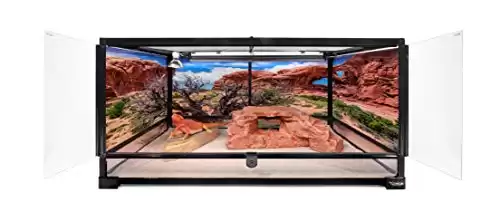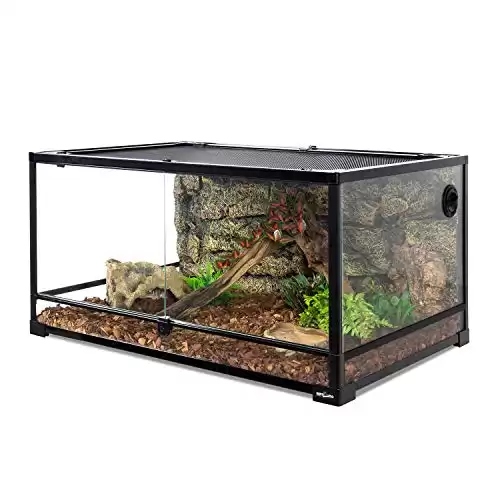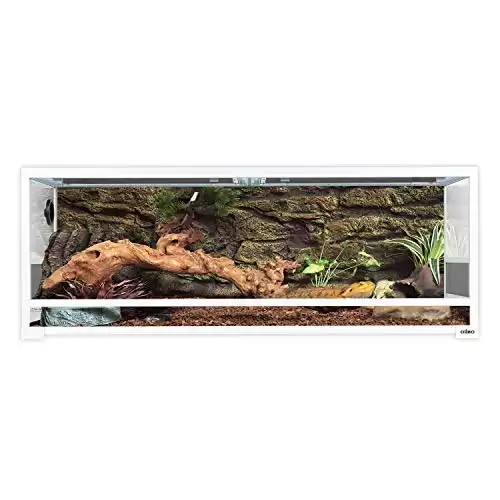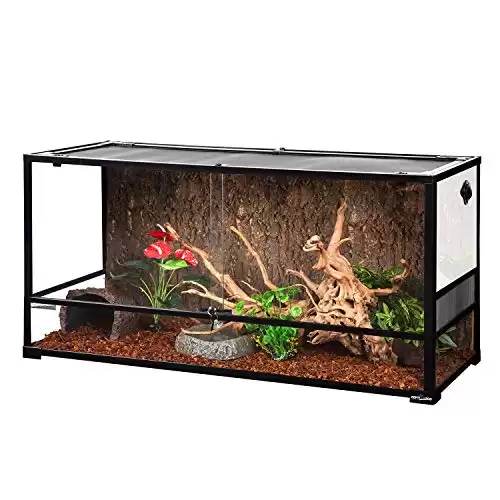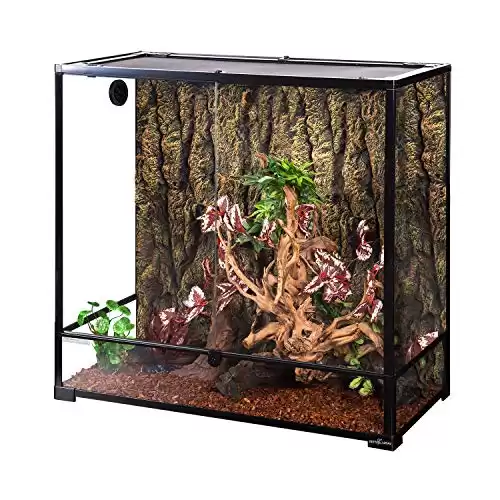If you are considering bringing home a new ball python, you have probably asked yourself the question: What is the best ball python enclosure?
One of the most exciting parts about getting a new reptile is picking out
The good news is that ball pythons are very easy to take care of. They have only a few special care requirements and don’t require a huge
Because they are so hardy and versatile, choosing a ball python enclosure comes mostly down to your personal preference. However, there are a few things you’ll want to consider, including how much floor space there is, how you will heat the
In this article, we do a deep dive into the top tanks for ball pythons to help you pick the right one for your new scaly friend.
TOP PICK
After carefully reviewing all of the options for ball python enclosures, our top pick is the Carolina Custom Cages 36x18x18
Terrarium . Thisterrarium is similar in size to a 40-gallon breeder, which is the recommended size for a ball python. Unlike a regular tank, however, thisterrarium has lockable front-opening doors.
It’s easy to assemble and is also the most budget-friendly on our list of recommendations!
The Best Ball Python Enclosures Are…
- More budget-friendly than other similar enclosures
- Easy assembly
- Terrarium glass holds heat well
- Somewhat small for an adult ball python
- The lock feature isn’t the most secure
- Terrarium glass is ideal for retaining heat
- Raised frame makes it easy to add a substrate heater
- Double-hinge doors allow for easy feedings
- Only slightly larger than the minimum recommended size
- Unusual dimensions might make finding a terrarium stand difficult
- Maintains the proper humidity and temperature gradient
- Sliding doors stay out of the way when opened
- Has a raised frame for substrate heating
- More expensive than other terrariums of the same size
- The white framing may show dirt more easily than black would
- Sliding doors can open both ways, making feeding a breeze
- Tempered glass is less likely to show scratches
- Easy assembly
- Anti-escape lock
- Having both top and side ventilation may make it more difficult to maintain humidity
- Not as budget-friendly as other options
- Multiple options for terrarium heating
- Provides extra space to add decor such as ledges
- Wire inlets allow for easy organization of light and thermometer cords
- Has a lot of vertical space that might not be useful to a ball python
- Not as budget-friendly as other options
1. Large Carolina Custom Cages Terrarium (40 Gallon)
This
It’s the equivalent of a 40-gallon breeder tank, which is the minimum amount of space that a ball python needs to thrive.
Key Features
- Glass
terrarium - Front-opening doors
- Key-lock security
- Screen ventilation
Glass enclosures are great at retaining heat so that you can keep your python’s body temperature at the right level. Additionally, the front-opening doors make feeding and getting your ball python out of the enclosure a breeze.
This
Pros
- More budget-friendly than other similar enclosures
- Easy assembly
- Terrarium glass holds heat well
Cons
- Somewhat small for an adult ball python
- The lock feature isn’t the most secure
If you are looking for a reptile enclosure that meets the minimum requirement for a ball python, will hold a proper temperature gradient, and won’t break the bank, look no further!
2. REPTI ZOO Glass Terrarium (67 Gallon)
This 67-gallon
Made out of glass with a screen top, this tank will hold temperatures well while also providing lots of airflow.
Key Features
- Glass
terrarium - Double-hinge doors
- Screen ventilation
- Raised bottom frame
When it comes to choosing a
If you choose to heat your ball python’s enclosure using a heat mat that goes under the
Pros
- Terrarium glass is ideal for retaining heat
- Raised frame makes it easy to add a substrate heater
- Double-hinge doors allow for easy feedings
Cons
- Only slightly larger than the minimum recommended size
- Unusual dimensions might make finding a
terrarium stand difficult
Maybe you want to provide your ball python with more space than the bare minimum recommended, but you don’t have a huge budget. If that’s the case, this
3. OIIBO Reptile Terrarium (67 Gallon)
You would think this product would be the same size as the REPTI ZOO 67 gallon
While all of the other terrariums on our list of best ball python enclosures are black, this one is clean white. This makes it a great choice for anyone who is looking for a sleek and stylish tank that won’t stand out too much in your home.
Key Features
- Glass
terrarium - Sliding door
- White frame
- Screen ventilation
With sliding glass doors, the Oiibo
Unlike the other terrariums on our list, this one has sliding glass doors instead of doors that swing outward. This can be extremely beneficial when cleaning or interacting with your pet because they are less likely to get in the way or get caught on things.
Pros
- Maintains the proper humidity and temperature gradient
- Sliding doors stay out of the way when opened
- Has a raised frame for substrate heating
Cons
- More expensive than other terrariums of the same size
- The white framing may show dirt more easily than black would
If you are looking for something that looks a little nicer and sleeker than your average
4. REPTI ZOO Large Reptile Tank (85 Gallon)
This
Made out of glass with both top and side ventilation, this
Key Features
- Tempered glass
- Front sliding door
- Top screen ventilation
- Side ventilation
Like other REPTI ZOO products, the base of this tank is raised, so installing a substrate heater is a simple task. Additionally, the anti-escape lock helps prevent a snake escape!
Pros
- Sliding doors can open both ways, making feeding a breeze
- Tempered glass is less likely to show scratches
- Easy assembly
Cons
- Having both top and side ventilation may make it more difficult to maintain humidity
- Not as budget-friendly as other options
This
5. REPTI ZOO Large Reptile Terrarium (100 Gallon)
Are you looking for something more unique than a standard
This ball python
Key Features
- Vertical
terrarium - Made of glass
- Wire organization
- Lockable doors
The vertical space in this
Because it’s so tall, you can heat this
Pros
- Multiple options for
terrarium heating - Provides extra space to add decor such as ledges
- Wire inlets allow for easy organization of light and
thermometer cords
Cons
- Has a lot of vertical space that might not be useful to a ball python
- Not as budget-friendly as other options
This ball python enclosure can make the perfect centerpiece to a room when decorated, but keep in mind that your ball python won’t really be able to make the most out of the space because of the tall dimensions.
How to Choose the Best Terrarium for Your Ball Python
At the end of the day, the best adult ball python enclosure is going to depend on the age and size of your pet snake and what kind of budget you have. There is nothing wrong with choosing a smaller enclosure as long as it meets the minimum requirement; however, if you have the budget, you may opt for a larger enclosure that will give your scaly baby more room to roam.
While there’s no perfect enclosure, these are the considerations you should keep in mind when deciding on a
Sufficient Floor Space
A 40-gallon is the minimum for a ball python for good reason.
Keep in mind that pythons can grow to four to five feet, so as with other terrestrial reptiles, having sufficient floor space is a must. This also means that horizontal enclosures – terrariums that are longer than they are tall – are much preferred over vertical enclosures.
Ball pythons are not big climbers in the wild or in captivity, so they won’t be able to make the best use out of a tall
Holds Heat and Maintains Humidity
Ball pythons are tropical snakes, which means they need a warm, humid habitat to be healthy and happy. Because of this, one of your biggest priorities when choosing an enclosure should be finding one that maintains heat and humidity levels well.
The material an enclosure is made of has the greatest effect on this. For example, glass is great at retaining temperatures and humidity levels. Before purchasing a tank, it’s a great idea to read the reviews and see if anyone has had any issues with maintaining conditions.
Easy Access
It’s important to choose a
Additionally, some reptiles get spooked when they are picked up from overhead, so having a front-opening enclosure means you are less likely to startle or stress them.
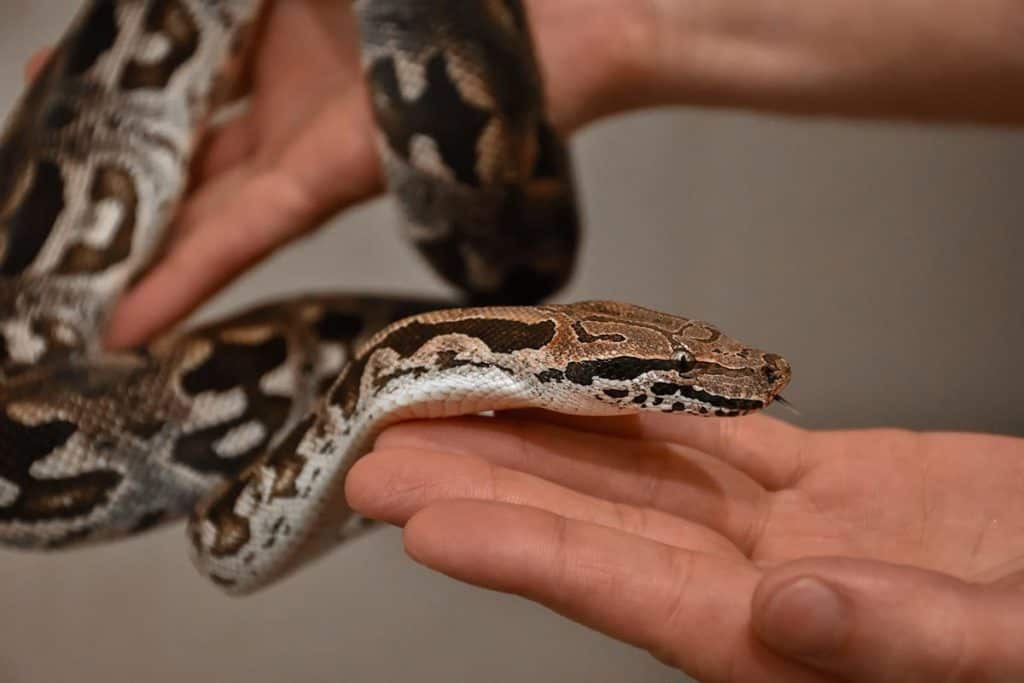
How to Create the Perfect Ball Python Tank Setup
Remember you want to create a tank that replicates your snake’s natural habitat as much as possible. To do this, make sure you factor in the below to your ball python tank setup:
- A tank with plenty of space for your python (glass tanks are particularly good at retaining temperature and humidity).
- Pythons like their privacy so make sure you have a couple of hide boxes where they can sleep and recuperate. It’s also a good idea to include a humid hide as this can keep humidity levels up.
- Pythons need to stay hydrated and they love a good soak. So make sure you have a large
water bowl in their enclosure and regularly clean it out and top it up with fresh water. - Pythons like a thermal gradient so create a basking area as well as a slightly cooler area within the tank. You can use heating devices such as heat lamps, heat pads or radiant heat panels.
- Add a layer of substrate to the bottom of the enclosure. This makes it more comfortable for the snake to move around. Look for absorbent materials like cedar shavings and aspen shavings. Read our guide to the best substrates for pythons.
- It’s a good idea to add decorations such as artificial foliage and wooden ledges to your python’s tank. Decor will give your python extra privacy and mimic its natural environment.
Pythons don’t need UVB lights as they are generally nocturnal or crepuscular but they do need a clear night cycle. Make sure they have 12 hours light and 12 hours darkness each day to keep your snake healthy.
Have a look at our essential guide to ball python care for more information.
FAQs on Ball Python Tanks
What is the best size tank for a ball python?
The minimum recommended tank size for a ball python is a 40-gallon breeder, which is roughly 36 inches long by 18 inches wide.
This is enough space for a ball python to live comfortably, but many breeders and hobbyists recommend a 48 by 24-inch enclosure, which is the equivalent of 120 gallons! While this may seem like overkill, it will give your ball python much more space to explore. As an added plus, you’ll have more room for adding
Baby ball pythons are also sometimes kept in smaller tank sizes, like 20 or 30 gallons, but you should upgrade them into a larger enclosure as they grow.
Do snakes grow according to tank size?
This is a popular misconception, similar to the myth that goldfish will only grow to the size of the aquarium they are kept in.
Snakes will continue to grow to their natural adult size regardless of the
Sure, you can stick a ball python in a tiny enclosure and they may survive, but they won’t thrive and they definitely won’t be at their healthiest. Keep in mind that 40 gallons is the minimum for a ball python, but bigger is often better!
Can a tank be too big for a ball python?
When it comes to ball pythons, a bigger tank is not always better. In some cases a bigger tank is preferable, but that isn’t always the case – which is why 40 gallons is the recommended minimum size!
Keep in mind that ball pythons in captivity often get stressed in huge enclosures. This can cause preventable issues such as excessive hiding and not eating.
You can combat this by making sure your ball python’s enclosure has a lot of nooks and crannies. You don’t want them to be cramped, but add enough embellishment so they feel safe and secure in their environment.
A Final Word on the Best Snake Enclosures for Ball Pythons
Getting a new pet is exciting, but it can also be stressful. This is especially true for reptiles! You want to make sure everything is prepared so that they have the perfect habitat when they arrive.
Ball pythons are excellent beginner snakes with easy care requirements. With that being said, there’s a lot to consider when you are choosing the perfect ball python enclosure. You should provide them with adequate floor space so they have room to move, but you also don’t want to overwhelm them with lots of free space.

